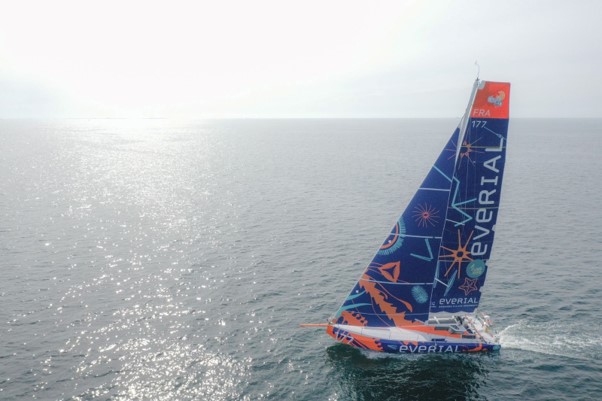Interviews, surveys, key events and news from Eurolarge Innovation members… Every 3 months, the Bretagne Sailing Valley® News covers the economic and technological news of the Breton competitive sailing. Discover below the news related to the eco-responsible sails.
Eco-responsible sails : are they a small revolution or something bigger ?
Résultat de la traducti
More and more, it seems that competitive sailing is seeking to become sustainable and environmentally conscious. Correspondingly the conversations in recent years have intensified as we seek to produce less waste and develop more eco-responsible sails. And some classes are especially aware of having a role to play in accelerating this environmental transition.
From January 1, 2023, the Imoca class rule will require each skipper to have on board “at least one green sail” for each race on their calendar, except “if the team has not purchased a new sail in 2023”. In 2024, the rule will apply to everyone. In effect “a green sail is a sail that is more eco-responsible in all aspects, by design throughout the production process from final waste disposal to its transport, by boat rather than by plane, including the energy expenditures in its manufacture,” says Imogen Dinham-Price, sustainability manager for the Imoca class. “We want to be a driving force on this topic, that’s why we set up a collaboration with all the sailmakers who joined around the table and worked out the Life Cycle Analysis (LCA) of their products. This allowed us all to understand the critical points of sail production.”
The Imoca class initiative has been very well received by the sailmakers, like North Sails: “It gave us a certain perspective and allowed us to realise areas where we can make improvements. We spent a lot of time studying the real impact of our sail production in all aspects”, confirms Gautier Sergent, General Manager France. “This was already a part of our company’s DNA. We use green energy where we can and recently transported the sails for the Ocean Fifty Koesio from the United States to Brittany by boat and not by plane, removed all the plastic tape in the packaging….. Little by little we are raising the level, sometimes these are small things, but all added up together, they amount to a lot.”
At Incidence Sails, environmental issues are taken into account, as Pierre-Antoine Morvan, offshore racing manager, points out: “We are all working towards the same goals. LCA has made it possible to better measure the impact of our waste. For 1 kilo of sail, we produce 6 kilos of waste, of course that’s too much! So we are trying to reduce this by working with new resins. In sourcing suppliers, we also favor how close they are to us to limit transport which actually represents 80% of the CO2 emissions in the production of a sail. We too buy green energy. The collaborative works carried out with different classes, including Imoca, allows everyone to move forward.”
And eco-design ?
Within the Mini Class, the topic promotes lively debates as well as some real, concrete measures. As from 2023, the dacron solent will be compulsory for production boats, as is already the case for the mainsail: “It is a material that does not delaminate, does not leave material in the water, unlike conventional membranes which wear out and shreds fall into the sea. It is no longer acceptable in any way to pollute our playground”, explains the new president of the class, Jean Marre.
And so what about eco-design and the use of vegetable fibers instead of synthetic fibers? “The subject is not yet really on the table, we should look into it more, we would like some prototypes to get started to validate the concept”, recognizes Jean Marre. At Imoca Imogen Dinham-Price speaks of “work on membranes in the longer term”. But some work has already been undertaken, two years ago, by the sailmakers All Purpose Carnac-La Trinité. “We made a mainsail partly in flax fibers for Adrien Hardy’s Figaro. The membrane was the same weight as a classic membrane and it didn’t compromise Adrien’s performance as he finished fourth in La Solitaire in 2020”, explains Frédéric Moreau, the co-manager.
Since then, All Purpose has fitted similar mainsails to the Class40s of Amélie Grassi and Stan Thuret, as well as Roland Jourdain’s Outremer 5X We Explore which of course was second in the Rhum Multi fleet on the Route du Rhum-Destination Guadeloupe. And the sailmaker aims to go further: “On mainsails, we now know that in terms of performance we are on an equal footing. The idea now is to test the membrane on headsails, which are more stressed.”
This will be pursued during 2023 with a solent for Marie Gendron’s 6.50 prototype, and, the sailmaker hopes, on an Imoca gennaker after finding skippers who agree to take part in this process. “To advance the state of the art, we need to carry out real co-development with the racers”, recalls Frédéric Moreau.
Credit Photo : © Stan Thuret
To receive a preview of articles, news, appointments… SIGN UP for the Bretagne Sailing Valley Newsletter®


